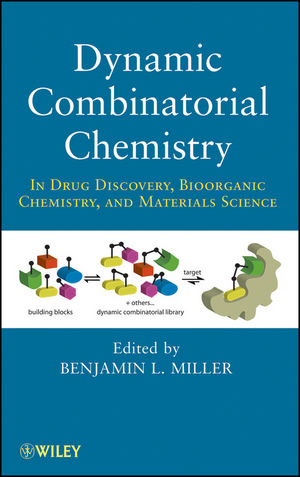Dynamic Combinatorial Chemistry: In Drug Discovery, Bioorganic Chemistry, and Materials ScienceISBN: 978-0-470-09603-1
Hardcover
280 pages
December 2009
 |
||||||
"The scientific quality of the book is high, and the book can be recommended to novices and experienced researchers that want to explore new terrain in organic synthesis." (ChemMedChem, 2010)“This is an excellent and highly recommended textbook.” (Angewandte Chemie International Edition, June 2010)
"The book edited by Benjamin Miller ... open[s] new horizons showing the first steps from molecular to nanolevel functional objects. These steps are sometime too long and the research strategies should expand the fundamental understanding of complex dynamic structures and properties as it relates to creating products and manufacturing processes.... Within this context, this book covers the most essential discoveries in DCC during the last decade. DCC employing evolutional approaches to produce chemical diversity is expressing a strong fundamental basis which certainly will serve for the development of the next generation of Dynamic Constitutional Systems.... The DCC general principles described in this book and their further elaboration will be guidelines for such future developments. Key questions concerning basic principles and related approaches that have been used in Dynamic combinatorial chemistry in order to control the evolution of dynamic systems are clearly presented by the selected topics of this book. The most revolutionary consequences may reflect the fascinating possibilities offered by selection, evolution, amplification and replication processes."—Dr. Mihai Barboiu, Institut Européen des Membranes, Adaptive Supramolecular Nanosystems Group IEM/UMII
"This book makes an outstanding reference book for molecular
recognition, physical organic, pharmaceutical, and supramolecular
chemists. It has enough information for one to learn and start
practicing in the field, but is also sophisticated enough for the
expert to use learn the approaches of their colleagues. Dr. Miller
has done an excellent job of bringing the DCC field together in a
cohesive and educational fashion. I recommend the book
enthusiastically."
—Dr. Eric V. Anslyn, The University of Texas



